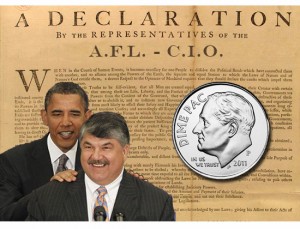NATIONAL
Amid attacks, unions declare independence
In the 2009 legislative session, just months after organized labor in Washington state had played a key role in helping to elect Gov. Chris Gregoire and to extend Democratic majorities in the Legislature, labor’s agenda “was not only ignored but attacked,” the Washington State Labor Council reported. The fallout from that fissure between unions and Democratic leaders led to a reevaluation of labor support of Democratic Party institutions, and inspired a new effort to target political efforts only to legislators who support labor’s agenda via DIME PAC (Don’t Invest in More Excuses).
Similarly frustrated with the inability of President Barack Obama and the Democratic-controlled Congress to advance labor legislation like the Employee Free Choice Act in 2009-10, and to defend against today’s anti-union attacks as Democrats concede the national agenda to House Republicans, national unions are conducting a similar reevaluation of their political programs.
The International Association of Fire Fighters recently announced it will redirect federal political contributions to defending anti-union attacks on the state level.
“These state battles are devastating to our members’ future,” said IAFF President Harold Schaitberger. “You would think that we would have our friends in Congress stepping up and stepping out and leading and be willing to fight for us. But right now, we don’t feel they have our back.”
 Now, Salon’s Joan Walsh reports that AFL-CIO President Richard Trumka is pledging that the nation’s largest labor federation will have a new independence from Democratic Party organizations and candidates.
Now, Salon’s Joan Walsh reports that AFL-CIO President Richard Trumka is pledging that the nation’s largest labor federation will have a new independence from Democratic Party organizations and candidates.
“You’ll see us giving less to party structure, and more to our own structure,” Trumka promised. “It’s actually going to be fun.”
Trumka goes on to outline his vision for how to harness the spontaneous public backlash against anti-labor Republican governors from Wisconsin to Ohio to Maine, and use that energy to rebuild the labor movement. Says Trumka:
“You’ll see more of labor’s money put into its own structure right now, and less being set aside for candidates and party structure. What you’re about to see is, we’re going to do a full-time, around the calendar political program that’s going to be mobilizing and educating people 12 months a year, 24 months a cycle, as opposed to doing it till Election Day and dismantling it. We’re going to keep people in place, and actually make people pay a price [if they don’t keep promises]. We’ll start running some of our own, in state races.”
Which begs the question, how will unions in Washington state decide to focus their political efforts heading into next year’s election cycle?
The state’s Democratic-controlled Legislature and governor have been generally supportive of labor’s agenda — especially when compared to the actively hostile counterparts in the Republican minority. However, some Democrats have aggressively pursued business-backed, labor-opposed legislation on everything from workers’ compensation to privatization of public services, and some Democratic leaders have either actively or tacitly supported those efforts. And of course, no one has forgotten the smackdown labor got in 2009.
“Ultimately, the Democrats who control our state government are deciding their own fate,” said Jeff Johnson, President of the Washington State Labor Council. “Our members decide who we support and who we don’t. But regardless of who gets endorsed, if our rank-and-file is discouraged by what they perceive as legislative attacks on working people, they will be disengaged when we do voter outreach.”
Adds Johnson: ” ‘It could have been worse’ isn’t a rallying cry, it’s a call for some new folks who can do better.”





